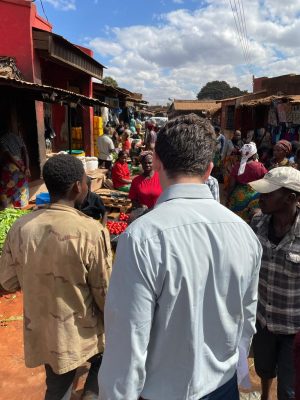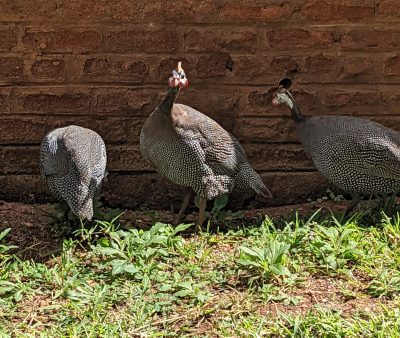Q&A with Griffin Bell, Ph.D. Candidate in the Department of Epidemiology
Will you tell us about your experience becoming a “Triple Tar Heel”? Have your professional goals or interests changed along the way?
I’m not originally from North Carolina, but I fell in love with UNC during a very rainy tour in December 2013. I came to campus in Fall 2014 and I’ve been a student here ever since. I finished my BSPH in biostatistics in 2018 and my MS in biostatistics in 2019 through the fantastic dual BSPH/MS program. I’m now in my fourth year of the epidemiology Ph.D. program. Some core UNC experiences have been the men’s crew team (which I have to thank for some of my best friends), working at UNC Project – Malawi during the summers of 2017, 2018, 2019, and 2022, and of course, the National Championship in 2017.
I decided in the fall of my sophomore year that I would do a Ph.D. in infectious disease epidemiology. Like many infectious disease epidemiology Ph.D. students, it was CDC’s Epidemic Intelligence Service that inspired me to enter the field. For several years, my goal was to gain acceptance to that program. After two summers at UNC Project – Malawi, I changed my mind. The experienced scientists and study personnel at UNC Project taught me the power of study area knowledge and continuity, which I observed to be the most important ingredients for effective interventions. I saw an avenue to gain this knowledge and continuity through a career in academia, thus, my goal for the past several years has been to become a professor. I want to continue working in Malawi and would be happy to stay at UNC forever if you’ll have me.

Will you tell us about your infectious disease research?
 The common thread is the use of geospatial data to understand disease transmission and associated interventions. Thus far, I have mainly concentrated on Malaria and HIV in Africa. My main mentors at UNC include Dr. Kimberly Powers (my advisor), Dr. Michael Emch, and Professor Irving Hoffman.
The common thread is the use of geospatial data to understand disease transmission and associated interventions. Thus far, I have mainly concentrated on Malaria and HIV in Africa. My main mentors at UNC include Dr. Kimberly Powers (my advisor), Dr. Michael Emch, and Professor Irving Hoffman.
My malaria research, based in Malawi, Gabon, and Ghana, concerns the first malaria vaccine to clear phase III trials, RTS,S. The vaccine is now recommended for widespread implementation by WHO. The efficacy of the vaccine varied widely between the phase III study areas, and our task was to figure out why. We just published a paper where we showed that vaccine efficacy was lower in high transmission settings due to a phenomenon known as ‘rebound’ or ‘delayed’ malaria. To investigate this, we incorporated a wide variety of ecological data to predict malaria transmission intensity within study areas.
My HIV research concerns the acute stage of HIV infection, where high viral loads and unawareness of HIV status results in higher transmission rates. Funded by an NIH F31 award, we are using geospatial and phylogenetic methods to investigate the clustering of acute HIV cases in Lilongwe, Malawi. An undergraduate, Skyler Noble, and I also finished mapping venues where HIV transmission might occur (e.g. brothels) in Lilongwe (with Dr. Sharon Weir), and it will be interesting to see if areas with a high density of these venues will also be areas with clusters of acute HIV cases. Finally, we will construct a spatially-explicit mathematical model of HIV transmission in Lilongwe to test the effect of potential interventions which interrupt HIV transmission during the acute phase, such as interventions focused on neighborhoods where outbreaks occur.
What does “global health” mean to you?
If I’m being idealistic, it means tackling each problem around the world with the most suitable experts that humanity can provide, regardless of where they happened to be born or where they currently live. For example, many global experts in controlling Monkeypox reside in Africa and the US would certainly benefit from their expertise here during our current outbreak.
Of course, historical legacies and current power structures sometimes crush this ideal against the rocks. When I think about my role in global health, I know a few things to be true. I have incredible access to funding and education and I have the time and energy to continually invest in specific communities and people. I want to use these assets to obtain funding to tackle relevant issues in the communities I serve and I want to use my education to train others.
What has been a highlight of your PhD program in Epidemiology?
One highlight was being a teaching assistant for Daniel Westreich’s Fundamentals of Epidemiology (EPID 710). Daniel wrote the textbook for this course and I’ve read through it three times: once when I took the course, once to prepare for the TA position, and once for fun. I love Daniel’s course (and text) because it is organized in the way my brain wants to store the information – it makes learning the basics of epidemiology efficient and intuitive.
This experience also helped confirm that I enjoy teaching. Combined with leading the methods qualifying exam review for the Ph.D. program this past spring and developing and teaching short courses on GIS for public health in Malawi and Ghana, I am confident in my decision to pursue a professorship.

What is your favorite animal and why?
I love flightless birds, because of the irony. My favorite flightless bird varies over time. I currently enjoy guinea fowls because of the beautiful black-and-white-spotted pattern. I consider them nearly flightless because the activity is quite laborious due to their rotund bodies.
